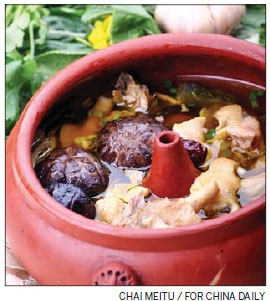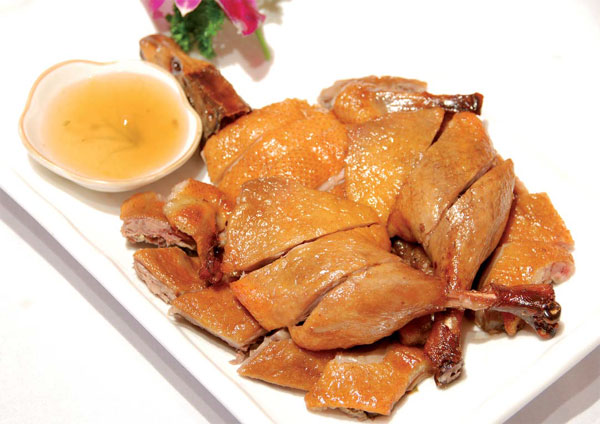Serve up a dish fit for a king

Editor's note: To understand China, sit down to eat. Food is the indestructible bond that holds the whole social fabric together and it is also one of the last strong visages of community and culture.
Yunnan cuisine has become popular of late. In almost all major cities in China, you are bound to come across exotic dishes from the so-called Land Beneath the Rainbow Clouds.
Food from this southwestern Chinese province is very grounded, its earthy flavors coming from the influence of ethnic and tribal groups, of which there are 27 scattered throughout the region.
The plentiful use of seasonings such as onions, garlic, wild peppers, chili, tamarind, herbal leaves and roots like coriander, dill, basil, mint, wild ginger and other rhizomes make its flavors nearer to that of Southeast Asia than continental China.
| Xiaodaoya is a main attraction hanging in the restaurant windows in Kunming. A Ying / For China Daily |
Today, let's look at two legendary birds that are famous in Yunnan that have retained their natural flavors without too much tampering.
One is a silky chicken cooked in a clay steamer pot - Yunnan's signature qiguoji. The other is an equally historic littleduck, first introduced by the province's Hui Muslims more than 600 years ago.
To understand the chicken, we have to flip the page of history back to the Qing Dynasty (1644-1911) during Emperor Qianlong's days. On one of his forays deep into Yunnan, he visited Jianshui, a city known for its crystal-clear springs and tofu.
The local governor decided you couldn't serve an emperor only spring water and tofu, so he commanded all the chefs in town to come up with a dish that could be set before a king.
An inventive cook decided to create a special dish out of the local red-glazed pottery. His pot had a funnel in the middle and allowed steam to enter and cook the meat without adding any liquid, based on the distillation principle.
The bird deemed worthy enough of such a unique pot was the local silky chicken, a small bird covered in snow-white feathers with blue ear patches and red wattles. Once stripped of its feathers, it was a black chicken, right down to its internal membranes and bones. It is also a sweet succulent bird without too much excess fat.
First, the chicken is dressed and chopped up into bite-size pieces that are carefully arranged around the funnel, rather like a Bundt pan. Thin slices of ginger, and salt and pepper are the only seasoning needed. No water is added. The lid is firmly closed and sealed with parchment paper.
The pot is then lifted onto another boiling pan of water and steamed for three to four hours. In the end, the poultry pieces inside the pot are miraculously swimming in an intense chicken broth.
We don't know if Emperor Qianlong liked this chicken, but it certainly got enough rave reviews from other satisfied customers that it stayed on the menu. Not only that, but it spread far beyond Jianshui and became the accepted dish to offer honored guests all over Yunnan.
As in every dish that becomes popular, successive generations of chefs have added their own touches.
Qiguoji is now offered steamed with Chinese herbs such as panax ginseng or cordyceps, and sometimes bird's nest is added for a touch of decadence.
In its simplest form, the three main ingredients are silky chicken, slices of Xuanwei ham, and the province's well-known mushrooms such as cepes, matsutake, chanterelles and porcini.
One thing is constant and that is the quality of the chicken broth, savory and full of the umami of the distilled bird. Properly made, it glisters with minute globules of tasty golden fat.
In another little town called Yiliang, on the way to the karst hills of the Puzhehei tourist district, it is a little duck that makes gourmets salivate.
It is indeed a little duck, for it must not be more than 40 days old when it hangs in the oven to roast. The end result is a tiny whole bird only as large as a man's fist and wing tips that easily fit on his fingernails.
Yiliang roast duckling is prepared much like Peking duck. These little cousins have the same succulent meat and crisp skin, but they come with bones so soft they can be crushed in the mouth.
In Kunming's prosperous Muslim quarters, the main attraction hanging in the restaurant windows are the rows upon rows of tiny roast ducks. They call them little knife ducks, or xiaodaoya. They are transplants from Yiliang and are prepared according to halal rites. Otherwise, the recipes are identical.
The ducks are drained of blood and blanched once to remove scum and grit. They are then dried before being rubbed inside and out with a mixture of salt fried with ground star anise, cardamom, fennel, cumin and Sichuan peppercorns.
The ducklings are then hung for four hours, after which the skin is inflated like a balloon to separate it from the meat.
The birds are dipped quickly into boiling water to tighten the skin before being repeatedly massaged with raw honey. After a final air-curing, the birds are hung inside steel drum ovens where they are roasted and then smoked.
It may seem to be a long process for such a little duck, but therein lies the attraction. The duckling skin is crisp and burnished with honey, the meat pink, tender and just a little gamey. Even the bones are often obliterated by eager foodies.
The name little knife duck comes from the Hui, who prefer to eat with their hands and often serve lamb and duck with a knife on the plate so diners can cut up individual portions.
The duck is served with a sweet bean paste dip and a dried chili flake mixture.
Yunnan offers many delicious encounters, but the adventure is never complete until you've met the black chicken in its funneled steamer pot, and the little spring duckling.
paulined@chinadaily.com.cn
Recipe to try
You may not have the luxury of owning a qiguo or steamer pot, but you can still enjoy the original flavors of steamed silky chicken. Most Asian grocery markets carry these little black birds.
Steamed black chicken
1 small silky chicken

Slices of any hard dried, cured ham
Dried mushroom like cepes, porcini, chanterelle; rehydrated
Salt and pepper
4 to 5 thin slices of ginger
Corn flour
Remove excess fat from the chicken and trim off any hanging flaps of skin. Discard the claws and head. Cut up the chicken in pieces that will fit into a deep bowl. Prepare the steamer on high heat.
Wash chicken pieces and marinate with salt, pepper and lightly dust with cornflour. You have salty ham in the platter so go easy on the white crystals.
Line the bowl with ginger slices and place the chicken pieces on top. Tuck the cut-up ham slices in between the chicken. Place the mushrooms on top.
Steam uncovered for an hour on medium heat. The long cooking will convert the steam into delicious chicken juice. That's the reason for a deep bowl.
(China Daily Africa Weekly 10/14/2016 page18)
Today's Top News
- Foreign ministers of China, Egypt call for Gaza progress
- Shield machine achieves Yangtze tunnel milestone
- Expanding domestic demand a strategic move to sustain high-quality development
- Xi hears report from Macao SAR chief executive
- Xi hears report from HKSAR chief executive
- UN envoy calls on Japan to retract Taiwan comments































